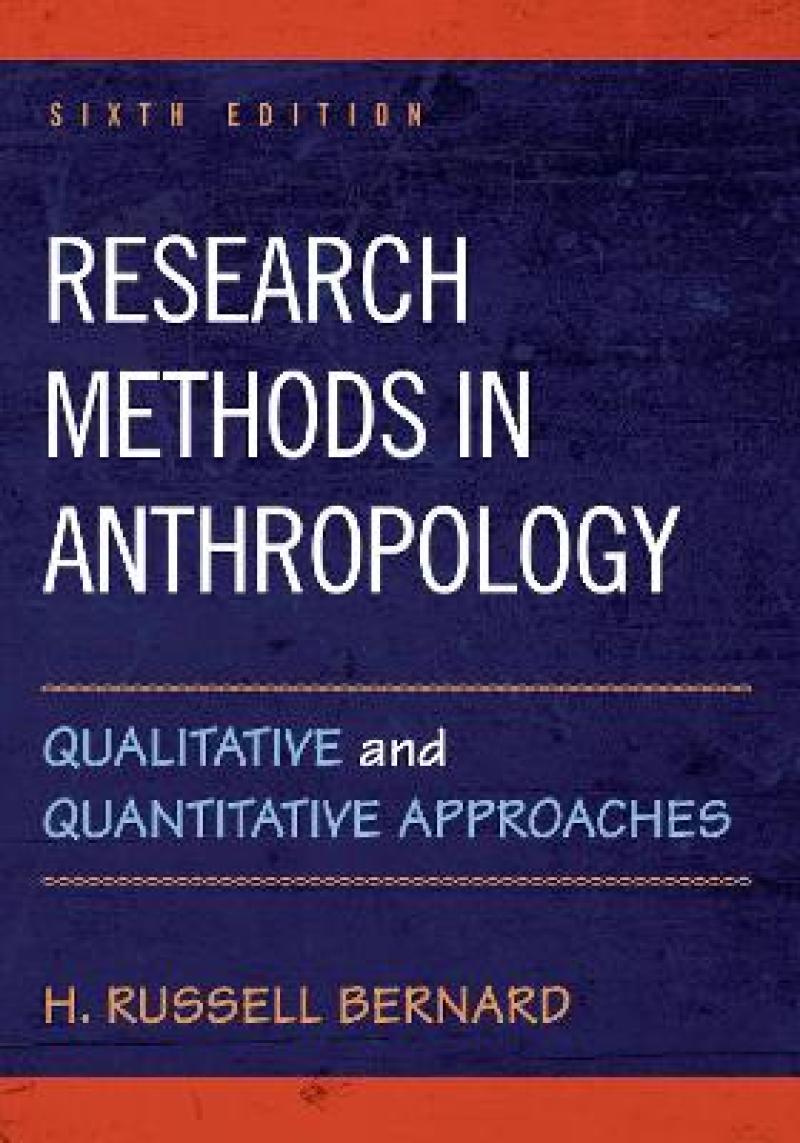H. Russell Bernard's Research Methods in Anthropology, Sixth Edition, is the standard for learning about the range of methods for collecting and analyzing qualitative and quantitative data about human thought and human behavior.
In the first section of the book, students learn the elements of research design, including how to choose a research topic, how to develop research questions and hypotheses, and how to choose an appropriate sample for their research.
In the next section, students learn the methods of data collection, including: open-ended interviewing, questionnaire design, participant observation, direct and indirect observation, building scales in the field, and taking and managing field notes. This section also introduces the methods for cultural domain analysis and network analysis.
The last section of the book covers methods for analyzing all these kinds of data, including: finding and analyzing themes in text, conversation and narrative analysis, and decision modeling, as well as descriptive and inferential statistics, multidimensional scaling. and cluster analysis. There is no separate chapter on ethics. That topic is important in every phase of research, even in the beginning phase of choosing a problem to study, and is covered throughout the book.
oA comprehensive research methods text for cultural anthropologists
oCovers research design, data collection and data analysis
oFull coverage of both qualitative and quantitative approaches
oWritten in plain language. Turns research methods into fun reading
oA real how-to, hands-on text
oExtensive bibliography on all topics covered in the book
Les mer
Research Methods in Anthropology is the standard textbook for methods classes in anthropology. Whether you are coming from a scientific, interpretive, or applied anthropological tradition, you will learn field methods from the best guide in both qualitative and quantitative methods.
Les mer
Preface v
About the Author xiii
1 Anthropology and the Social Sciences 1
2 The Foundations of Social Research 23
3 Preparing for Research 54
4 Research Design: Experiments and Experimental Thinking 83
5 Sampling I: The Basics 114
6 Sampling II: Theory 131
7 Sampling III: Nonprobability Samples and Choosing Informants 145
8 Interviewing I: Unstructured and Semistructured 163
9 Interviewing II: Questionnaires 195
10 Interviewing III: Relational Data, Cultural Domains and Networks 233
11 Scales and Scaling 254
12 Participant Observation 272
13 Field Notes and Database Management 308
14 Direct and Indirect Observation 323
15 Introduction to Qualitative and Quantitative Analysis 354
16 Cognitive Anthropology I: Analyzing Relational Data, Cultural Domains and Networks 362
17 Cognitive Anthropology II: Decision Modeling, Taxonomies, and Componential Analysis 416
18 Text Analysis I: Interpretive Analysis, Narrative Analysis, Performance Analysis, and Conversation Analysis 437
19 Text Analysis II: Schema Analysis, Grounded Theory, Content Analysis, and Analytic Induction 459
20 Univariate Analysis 491
21 Bivariate Analysis: Testing Relations 527
22 Multivariate Analysis 570
iv Contents
Appendix A: Table of Areas under a Normal Curve 598
Appendix B: Student’s t Distribution 601
Appendix C: Chi-Square Distribution Table 602
Appendix D: F Table for the .05 Level of Significance 604
Appendix E: Resources for Fieldworkers 606
References 611
Author Index 000
Subject Index 000
Les mer
New to Research Methods in Anthropology, Sixth Edition:
Chapter 2: updated literature throughout to reflect changes in various populations.
Chapter 3: new box includes tips for writing grant proposals; the discussion about paradigms has been updated to include an example of how explanations can be both nomothetic and idealist.
Chapter 4: includes a new section on economic games, a new description of the goal–gradient hypothesis, and a new example of the lost-letter technique.
Chapter 7: new section on mixed methods in sampling, including time–space sampling and the case control design. A new box introduces formal methods for selecting key informants, including network analysis, cultural consensus analysis, and multidimensional scaling. The discussion on sample size in nonprobability sampling, bringing in new empirical data on this problem, has been expanded.
Chapter 8: includes a new description of confirmation bias and the expectancy effect, and additional material on aided recall, including the use of landmarks and event/life-history calendars.
Chapter 9: new material includes a box on conversational versus standardized interviewing, an expanded discussion of the low response rate in survey research, and new examples on panel studies in the Antarctic, factorial surveys in China, randomized response techniques in Holland, and list experiments in Nicaragua.
Chapter 10: In addition to a new example of pile sorts with objects in New Guinea, this chapter has been expanded to include the collection of sociocentric and egocentric network data.
Chapter 11: a new example of the Guttman scale of cultural evolution has been added.
Chapter 12: new examples include gaining rapport in fieldwork in Alaska and participatory transects in Tanzania; there is a new box on language competence in fieldwork and an expanded section on staying safe in field research.
Chapter 14: includes a new box on reactivity and an expanded box on the ethics of pseudoclient and pseudopatient studies, as well as a new example of the study of garbage.
Chapter 16: updated box on getting pile-sort data into a computer and expanded box on the difference between metric and nonmetric data; a new section has been added on analyzing social network data, including a section on semantic networks.
Chapter 18: new example of ethnopoetics in classroom discourse.
Chapter 19: expanded the discussion of grounded theory and the section on analytic induction.
Les mer
Produktdetaljer
ISBN
9781442268883
Publisert
2017-11-17
Utgave
6. utgave
Utgiver
Vendor
Rowman & Littlefield Publishers
Vekt
1111 gr
Høyde
252 mm
Bredde
179 mm
Dybde
27 mm
Aldersnivå
U, 05
Språk
Product language
Engelsk
Format
Product format
Heftet
Antall sider
728
Forfatter
